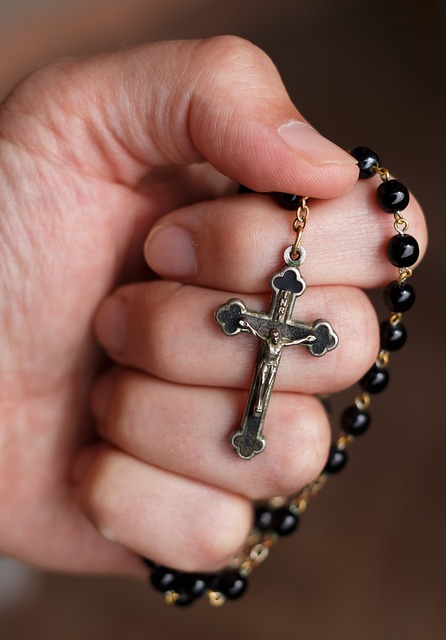Orthodoxy refers to a set of beliefs or doctrines that are considered to be the correct or traditional interpretation of a particular religion. While Orthodoxy has its own merits and followers, there are several reasons why some individuals may argue that it is wrong. This introduction aims to provide a brief overview of some of the criticisms and challenges that have been raised against Orthodoxy. It is important to note that this perspective does not represent the views of all individuals and should be understood as a starting point for further exploration and discussion.
Table of Contents
Examining the Historical Inaccuracies of Orthodox Teachings
Orthodoxy, a branch of Christianity that has been around for centuries, is often revered for its rich traditions and steadfast adherence to ancient teachings. However, upon closer examination, it becomes clear that there are several historical inaccuracies within Orthodox teachings. In this article, we will delve into some of these inaccuracies and explore why Orthodoxy is wrong.
One of the most glaring historical inaccuracies within Orthodox teachings is the claim that the Orthodox Church is the one true Church, tracing its roots back to the apostles themselves. While it is true that the Orthodox Church can trace its origins to the early Christian communities, it is disingenuous to claim that it is the only true Church. Christianity has evolved and branched out into various denominations over the centuries, each with its own interpretation of the faith. To assert that one particular branch is the sole custodian of truth is not only historically inaccurate but also undermines the diversity and richness of Christian beliefs.
Another historical inaccuracy within Orthodox teachings is the veneration of icons. Orthodox Christians believe that icons are windows to the divine and that they can mediate between the worshipper and God. However, this practice of icon veneration was not always a part of early Christian worship. In fact, it was a subject of intense debate and controversy in the early Church. The use of icons was only officially endorsed in the 8th century, during the Second Council of Nicaea. This historical fact raises questions about the authenticity and validity of the practice within Orthodoxy.
Furthermore, the Orthodox Church’s claim to apostolic succession is also questionable from a historical perspective. Apostolic succession refers to the belief that the authority and power of the apostles were passed down through the generations of bishops. While the Orthodox Church places great emphasis on this concept, there is little historical evidence to support the notion that every bishop can trace their lineage back to the apostles. The historical record is murky, and the idea of apostolic succession seems more like a theological construct than a verifiable historical fact.
Additionally, the Orthodox Church’s rejection of certain theological developments, such as the Filioque controversy, is another example of historical inaccuracy. The Filioque controversy revolves around the addition of the phrase “and the Son” to the Nicene Creed, which asserts that the Holy Spirit proceeds from the Father and the Son. The Orthodox Church vehemently rejects this addition, claiming that it was not part of the original creed. However, historical evidence suggests that the Filioque controversy was a complex issue that arose from theological debates between the Eastern and Western Churches. To dismiss it as a mere addition is to oversimplify a significant historical event.
In conclusion, while Orthodoxy may be revered for its traditions and steadfast adherence to ancient teachings, it is important to critically examine its historical accuracy. The claim of being the one true Church, the veneration of icons, the concept of apostolic succession, and the rejection of certain theological developments all raise questions about the validity of Orthodox teachings. It is crucial to approach religious beliefs with an open mind and a willingness to question and challenge long-held assumptions. Only through such critical examination can we truly understand the complexities and nuances of religious history.
Challenging the Doctrinal Differences between Orthodoxy and Other Christian Denominations

Why Orthodoxy Is Wrong
When it comes to Christianity, there are many different denominations, each with its own set of beliefs and practices. One of the oldest and most traditional denominations is Orthodoxy. However, despite its long history and devout followers, there are several reasons why Orthodoxy is wrong.
First and foremost, one of the main doctrinal differences between Orthodoxy and other Christian denominations is the issue of salvation. Orthodoxy teaches that salvation is a process that involves both faith and works. They believe that salvation is not a one-time event but a lifelong journey of sanctification. On the other hand, many other Christian denominations, such as Protestantism, believe in the concept of “faith alone” for salvation. They argue that salvation is a free gift from God and cannot be earned through good works.
This difference in belief has significant implications for how one understands the nature of God’s grace. Orthodoxy’s emphasis on works can lead to a legalistic understanding of salvation, where individuals feel the need to constantly strive for perfection in order to earn God’s favor. This can create a burden of guilt and anxiety, as believers are constantly questioning whether they have done enough to be saved. In contrast, the Protestant belief in “faith alone” allows for a more liberating understanding of God’s grace. It recognizes that salvation is a gift that cannot be earned, but is freely given to all who believe in Jesus Christ.
Another area where Orthodoxy is wrong is its view of the Bible. While Orthodoxy acknowledges the authority of the Bible, it also places equal importance on tradition and the teachings of the early church fathers. This means that the interpretation of Scripture is not solely based on the text itself, but also on the teachings of the church throughout history. This can lead to a rigid and inflexible understanding of Scripture, where the opinions of the early church fathers hold more weight than the actual words of the Bible.
In contrast, many other Christian denominations, such as Protestantism, emphasize the authority of Scripture alone. They believe that the Bible is the inspired and infallible Word of God and should be the ultimate authority in matters of faith and practice. This allows for a more personal and direct relationship with God, as believers are encouraged to read and interpret the Bible for themselves, guided by the Holy Spirit.
Furthermore, Orthodoxy’s view of the sacraments is also problematic. Orthodoxy teaches that the sacraments, such as baptism and the Eucharist, are necessary for salvation. They believe that these sacraments convey God’s grace and are essential for spiritual growth. However, this belief can lead to a sacramental understanding of salvation, where individuals rely on the performance of rituals rather than a personal relationship with Jesus Christ.
In contrast, many other Christian denominations, such as Evangelicalism, view the sacraments as symbolic acts that commemorate the work of Christ. They believe that salvation is received through faith in Jesus Christ alone, and that the sacraments are not necessary for salvation but are rather expressions of faith.
In conclusion, while Orthodoxy has a rich history and a devout following, there are several reasons why it is wrong. Its emphasis on works for salvation, its view of the Bible, and its understanding of the sacraments all deviate from the teachings of other Christian denominations. Ultimately, it is important for individuals to carefully examine their beliefs and compare them to the teachings of Scripture in order to determine what is truly right.
Critiquing the Role of Tradition in Orthodox Beliefs and Practices
Orthodoxy, with its rich history and deep-rooted traditions, has long been a pillar of religious belief for many. However, it is important to critically examine the role of tradition in Orthodox beliefs and practices. While tradition can provide a sense of stability and continuity, it can also hinder progress and limit individual freedom.
One of the main issues with Orthodoxy lies in its rigid adherence to tradition. Orthodox believers often view tradition as an unchanging and infallible guide to faith. This can lead to a resistance to change and a reluctance to question established practices. While tradition can be a valuable source of wisdom, it should not be treated as an unquestionable authority.
Furthermore, the emphasis on tradition in Orthodoxy can stifle individual interpretation and personal growth. Orthodox believers are often discouraged from exploring their own understanding of faith and are instead expected to conform to established norms. This can lead to a lack of critical thinking and a reliance on external authorities for guidance.
Another problem with the role of tradition in Orthodoxy is its potential to perpetuate harmful beliefs and practices. While some traditions may have historical and cultural significance, they may also be rooted in outdated and discriminatory ideas. For example, the exclusion of women from certain roles within the church is often justified by appealing to tradition. This not only limits the potential contributions of women but also reinforces gender inequality.
Moreover, the rigid adherence to tradition can hinder the ability of the Orthodox Church to adapt to the changing needs of its followers. Society is constantly evolving, and religious institutions should be able to respond to these changes in order to remain relevant. By clinging to tradition, Orthodoxy risks becoming disconnected from the realities of modern life and alienating a younger generation seeking a more inclusive and progressive faith.
It is important to note that critiquing the role of tradition in Orthodoxy does not mean dismissing the entire faith. There are many aspects of Orthodoxy that are valuable and meaningful to its followers. However, it is crucial to recognize the limitations of tradition and the potential harm it can cause when it becomes an unquestionable authority.
In conclusion, the role of tradition in Orthodoxy should be critically examined. While tradition can provide stability and continuity, it can also hinder progress and limit individual freedom. The rigid adherence to tradition can stifle personal growth and perpetuate harmful beliefs and practices. It is important for the Orthodox Church to be open to change and to adapt to the evolving needs of its followers. By doing so, it can ensure that it remains a relevant and inclusive faith for generations to come.
Exploring the Contradictions within Orthodox Theology and Scripture Interpretation
Orthodoxy, a branch of Christianity that adheres to traditional beliefs and practices, has long been a source of controversy and debate. While many people find solace and guidance in its teachings, there are those who argue that Orthodoxy is fundamentally flawed. In this article, we will explore some of the contradictions within Orthodox theology and scripture interpretation, and why they may lead some to question its validity.
One of the main criticisms of Orthodoxy is its rigid adherence to tradition. While tradition can provide a sense of stability and continuity, it can also hinder progress and innovation. Orthodox theology often places a heavy emphasis on the authority of the Church Fathers and the decisions made at the Ecumenical Councils. This reliance on the past can make it difficult for the Orthodox Church to adapt to the changing needs and values of modern society.
Another area of contention is the interpretation of scripture within Orthodoxy. While the Orthodox Church claims to have a consistent and unchanging interpretation of the Bible, there are many instances where different interpretations exist. This can lead to confusion and disagreement among believers, and raises questions about the reliability of Orthodox teachings.
One example of this is the interpretation of the creation story in Genesis. Orthodox theology teaches that the creation account should be understood as a literal, historical event. However, many scientists and scholars argue that the evidence points to a much older earth and a more complex process of evolution. This disconnect between scientific evidence and Orthodox interpretation can create a tension for those who seek to reconcile their faith with modern knowledge.
Another contradiction within Orthodox theology is its view on salvation. While Orthodoxy teaches that salvation is a process of becoming more like Christ and participating in the divine nature, it also emphasizes the importance of good works and sacraments. This emphasis on works can lead to a legalistic understanding of salvation, where one’s worthiness is determined by their actions rather than their faith. This contradicts the Protestant belief in salvation by grace alone, and raises questions about the role of human effort in the process of salvation.
Furthermore, the Orthodox Church’s stance on social issues can be seen as contradictory. While it upholds traditional values and teachings on topics such as marriage and sexuality, it also emphasizes the importance of love, compassion, and inclusivity. This tension between traditional values and the call to love and accept others as they are can create a sense of confusion and conflict for believers.
In conclusion, Orthodoxy is not without its contradictions and challenges. Its rigid adherence to tradition, varying interpretations of scripture, and conflicting views on salvation and social issues can lead some to question its validity. However, it is important to remember that no religious tradition is without its flaws. Ultimately, the decision to embrace or reject Orthodoxy is a personal one, based on individual beliefs, experiences, and understanding.
Conclusion
In conclusion, it is important to note that the statement “Why Orthodoxy Is Wrong” is subjective and can vary depending on individual perspectives and beliefs. It is crucial to approach religious matters with respect and open-mindedness, acknowledging that different faiths and denominations hold their own unique interpretations and practices.
For licensing reasons, we must provide the following notice: This content was created in part with the help of an AI.


